9th Friends of Hungary Foundation Conference
Former President of the National Academy of Sciences, E. Sylvester Vizi had opened the 9th annual conference of the Friends of Hungary Foundation in Budapest. In his address, the President of the Friends of Hungary Foundation (MOBA) emphasized the track record of success that characterizes the Hungarian diaspora around the globe.
In his speech Professor Vizi emphasized that patriotism exists independently of the location where one lives. Rather, it mostly depends on one’s language and culture.
We as a nation are successful, said the MOBA President. We have committed many mistakes during our history, but we have survived these, and now we are still here. This is the result of the work of many Hungarians, and we are proud of all of them”, he noted. We are proud of those, who have spread the word around the world that one can count on us, Hungarians.
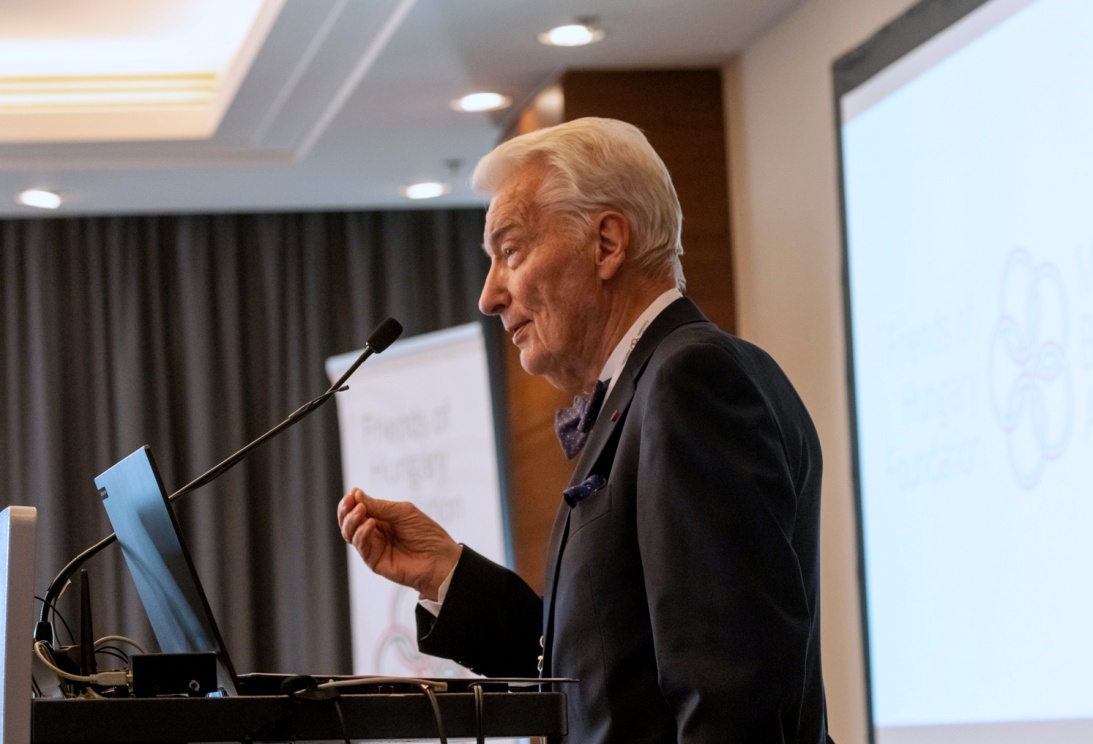
The MOBA president reminded guests of the conference that Hungarians have spread across the globe throughout the centuries. However, wherever there are Hungarians, there are successful ones among them. The goal of the foundation is to make Hungarian successes in the homeland or in their new home countries more visible.
What is behind this success, asked the President of MOBA. What is holding us together? “It is our history, the sum total of both our success and failure means that it is worth belonging in the Hungarian global community, to belong with us”. However, it is important to add that if one belongs to a community, he also owes that community. Hungarians living across the world feel that they owe something to Hungary, even though it was their grandmothers or grandfathers who have come from the motherland.
President Novák Meets Members of the Friends of Hungary Foundation
President of the Republic, Katalin Novák, had welcomed delegates of the MOBA conference at the Museum of Fine Arts, where the V. Demographic Summit is being held simultaneously.
Among the guests were Gergely Gulyás, the Minister heading the Prime Minister’s Office, E. Sylvester Vizi, President of the Friends of Hungary Foundation, and János Martonyi, former Foreign Minister, and member of the board of MOBA.
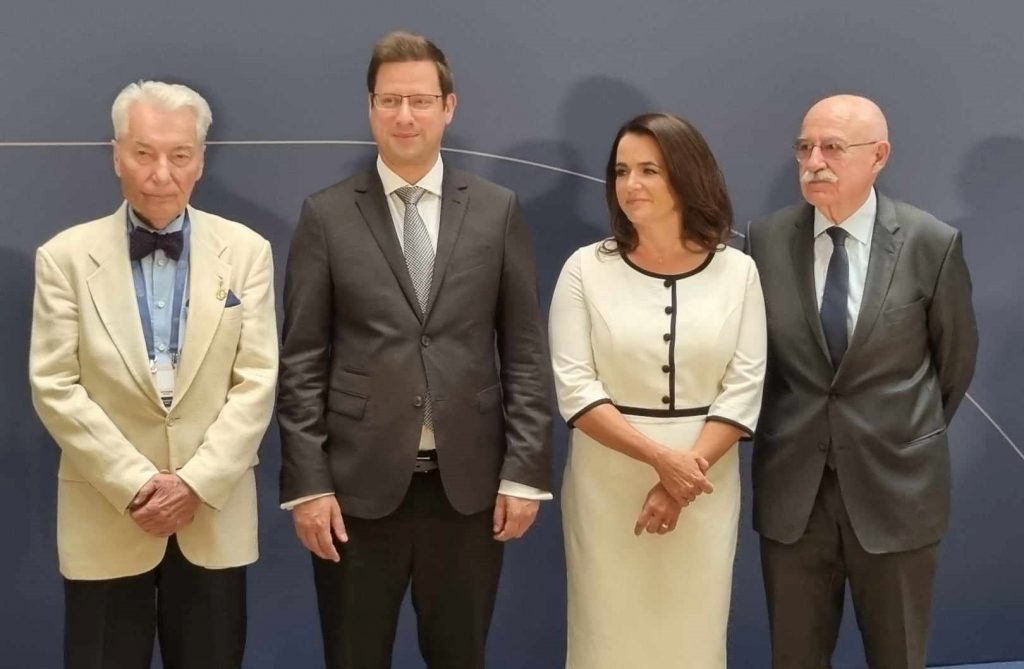
Gergely Gulyás spoke about the rising interest in Hungarian achievements, from sports, to science and culture and asked guests of the MOBA conference to strengthen the good reputation of our country. In the name of the Hungarian government he pledged his support for Hungarian communities abroad and emphasized the importance of the work of all of those, who work tirelessly to enhance Hungary’s good name.
President Novák also addressed guests of the MOBA conference before having personal discussions with them. She spoke about the V. Demographic Summit that she is the main patron of, currently underway in Budapest. The central focus of the summit are families. She warned that the greatest challenge that the West is currently facing is severe population decline. Kindergartens and schools are empty, and some people draw more pleasure from working with artificial intelligence, for instance, than from having their own, real children, she pointed out.
The Hungarian President also spoke of another family- the family of Hungarians who live across the globe, some of whom are now visiting Budapest for the MOBA conference. Hungarians living in the motherland and those who live abroad care for each other, she emphasized. She called on her guests to witness how Hungary is actively becoming the focus point of a discussion that is essential for the entire world. She said that guests are coming to the summit not only from countries with worrying negative demographic trends, but also from ones where the demographic boom is causing severe social problems, such as Tanzania.
“Whether you have agreed or not, you are ambassadors of Hungary,” Says State Secretary
Árpád János Potápi, Secretary of State for National Policy of the Prime Minister’s Office, gave a presentation at the 9th Friends of Hungary Foundation conference. As he recalled, the Hungarian nation is a global nation, of which Hungarians living in the diaspora are an integral part.
“Whether you have agreed or not, you are ambassadors of Hungary,” began his speech the State Secretary, who stressed that historical events have made us a nation, especially in the modern era. He cited the example the Hungarians who chose to leave their homeland in 1956 due to the terrible consequences and terror of communism, but who nevertheless still contribute greatly to the Hungarian nation being well known around the globe. The redrawing of our historical borders, population decline and growth, catastrophic events such as the tragedy of the Second Hungarian Army, the forced labor of Hungarians in the Soviet Union – these have shaped our history and the Hungarian nation, Árpád János Potápi recalled.
The fact that the nation has been able to overcome all the atrocities of history is largely thanks to the diaspora.
To take a look at the numbers and discover how wide the diaspora is, we can see that there are currently 1.5 million Hungarians in the United States, 350,000 in Canada, 70,000 in Australia and New Zealand, and around 350-400,000 in Europe. This makes a total of 2.5 million people. In this context, the Secretary of State stressed that “the Hungarian nation must be looked after in order to preserve its identity”.
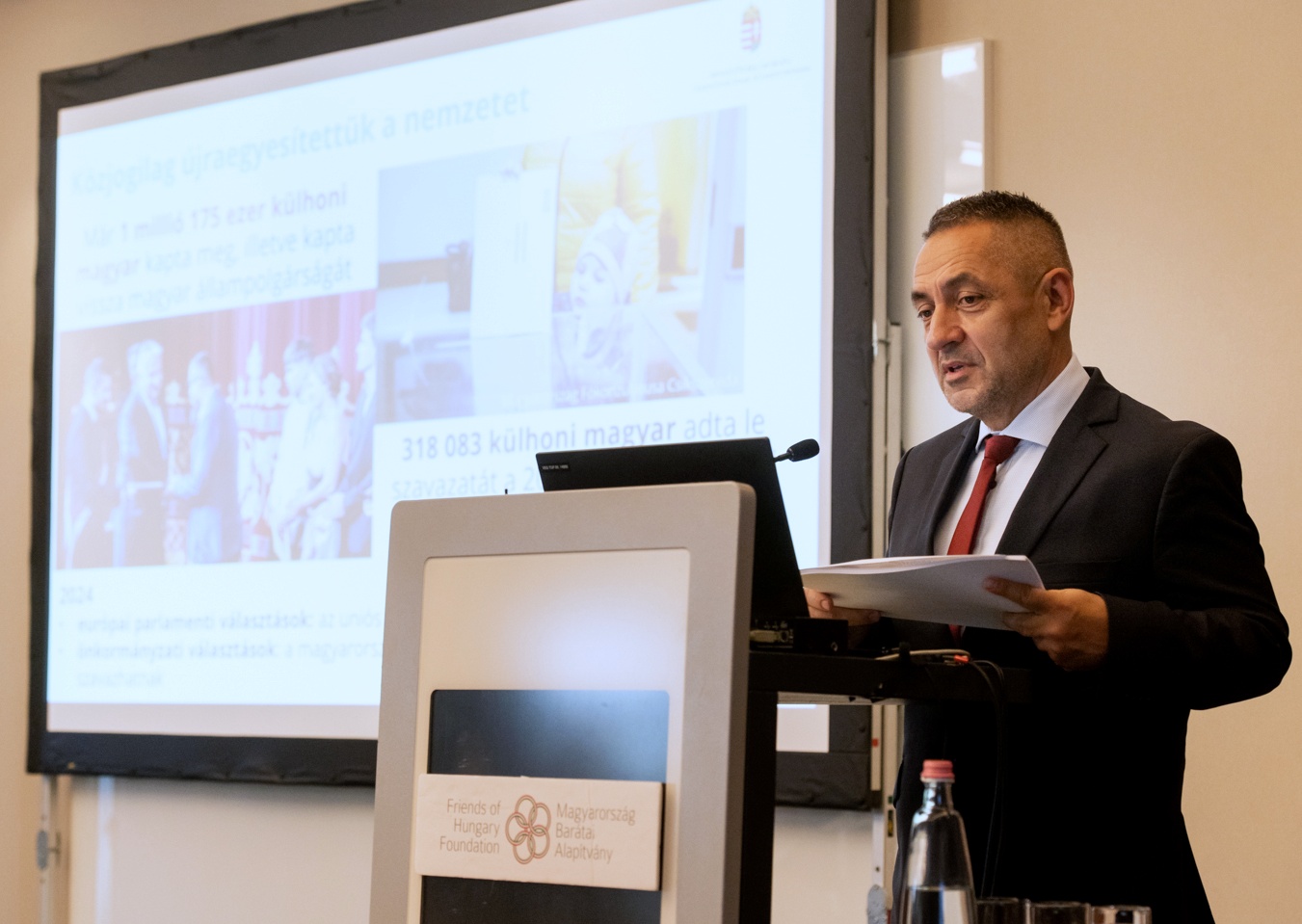
After 2010, it can be seen that unified national policy exists. The most important goals and motivations were also formulated at this time. These include the preservation and strengthening of national identity, support and contributions to encourage people to stay in their homeland, and family allowances.
On schools, the Secretary of State referred to special scholarship and travel programs for students such as the Without Borders program, the Kőrösi and the Petőfi programs.
At the end of his speech, János Árpád Potápi also touched upon the situation of the Hungarian minority in Ukraine. Since the beginning of the Russian-Ukrainian conflict, one and a half million Ukrainians have arrived in Hungary. For those fleeing the horrors of war, the country has set up the largest humanitarian program ever. Hungary is also trying to help in Ukraine by building schools, medical institutions and by charitable collections, he said. In fact, in 2023, the Hungarian government provided HUF 13 billion (EUR 34 million) to support the development of the Transcarpathian Hungarian community’s institutions. However, atrocities against the Hungarian minority continue, and anti-Hungarian manifestations are ongoing, the State Secretary underlined. Examples include the demolition of the statue of the Turul bird (national symbol) in Mukachevo (Munkács) in 2022, or the events of recent weeks at the Mukachevo secondary school, where the principal, István Schink, was dismissed and the Hungarian anthem and national symbols were banned, he concluded.
The family is the basic unit of the nation
Csaba Latorcai, Deputy Minister and State Secretary at the Ministry of Regional Development, gave a presentation entitled "Hungary and Brussels in the light of subsidies".
The politician recalled that EU subsidies have been frequently reported in the last year and a half. Referring to the 2014-2020 budget period, the state secretary said that Hungary has been able to absorb 90.8 percent of the funds so far, which is higher than the EU average (82.5 percent). "There is a chance and hope that Hungary will be able to absorb 100 percent of the funds it is entitled to by December 31, 2023, the latest date of the previous seven-year EU budget period, and use them as efficiently as possible," he stressed.
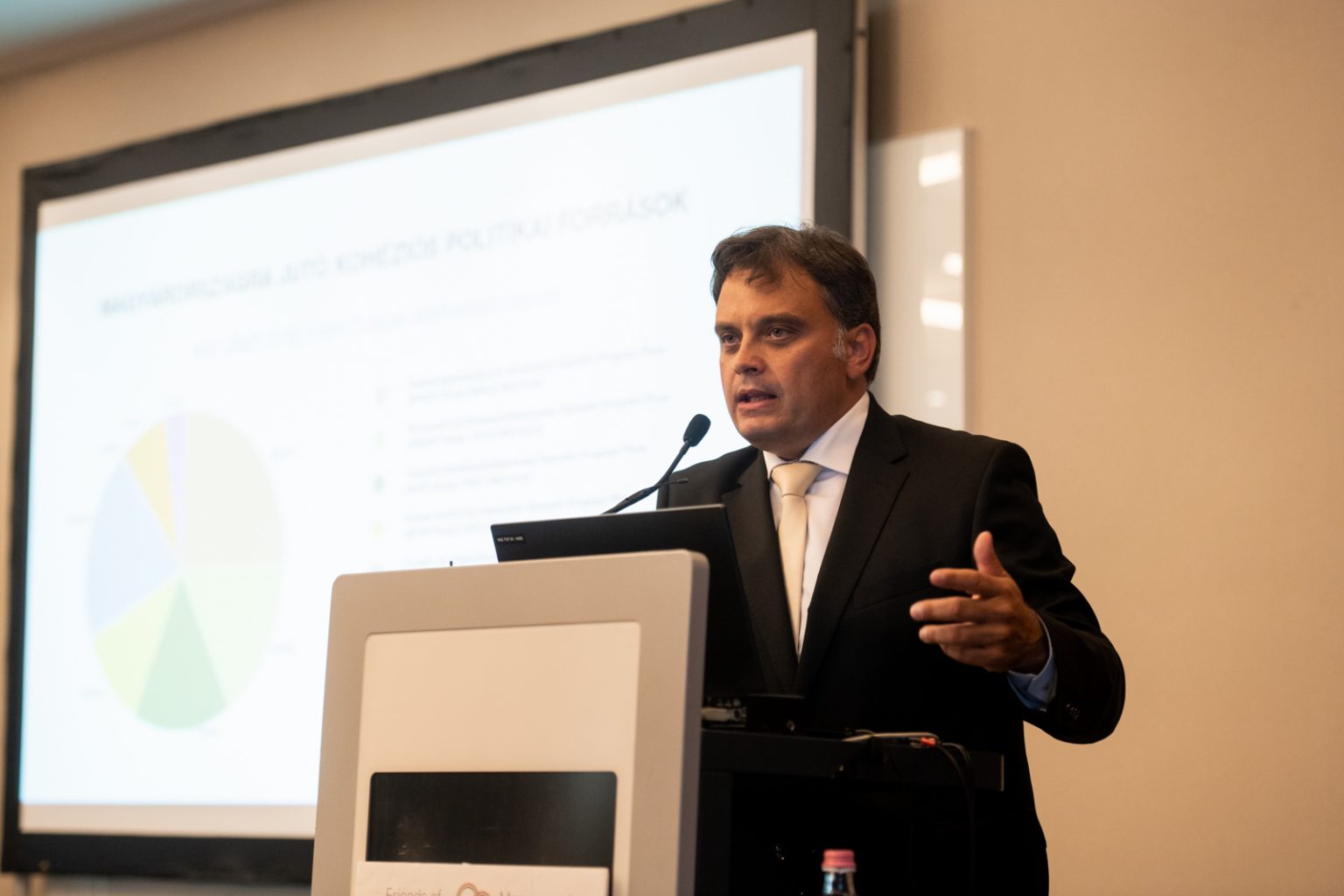
Regarding the funds for the next seven-year development period (2021-2027), Csaba Latorcai stated that "we are confident" that the EU funds will arrive in Hungary sooner or later, which will benefit Hungarian people and businesses.
With the help of these funds, we can launch the program to make Hungary one of the five most livable EU member states by 2030, the state secretary described the government's main goal for the next funding period.
The reason Brussels is withholding funds is because of Hungary's position on three issues, Csaba Latorcai said. These are positions on migration, gender ideology and the Russian-Ukrainian war.
Commenting on Hungary's presidency of the EU Council, Csaba Latorcai said, "In the second half of 2024, Hungary wants to shape the future of the continent by working for a Europe of nations.
Winners of the 2023 Friends of Hungary Foundation Awards Announced
The Friends of Hungary Foundation awarded the Friend of Hungary Award for the sixth time in 2023. Established in 2016, the prize was first handed out in May 2017.
Pál Schmitt, former President of the Republic, gave a speech entitled “Hungary is a sporting nation”. In his address he emphasized that Hungarians are a sports nation, and this notion is an integral part of the Hungarian identity. This is something to be proud of, the 1968 and 1972 Olympic fencing champion stressed. He recalled that every Olympics in which a Hungarian competitor has taken part has produced a gold medal. Hungary is the most successful nation at the Olympics in terms of the number of gold medals won per million inhabitants, tied with Finland, he reminded.
Pál Schmitt added that this alone would make you think that Hungary is a true sporting nation, but 30% of Hungarian children today do not play any sport at all. However, the government has recognized this and has set goals to make Hungary a high achiever in sports again. Daily physical education has been introduced into the curriculum, and by the end of the 8th grade of primary school, all pupils are expected to be able to swim at least 200 meters. The former president also emphasized that sport is also important for building community and making friends who can spread our good name to the world.
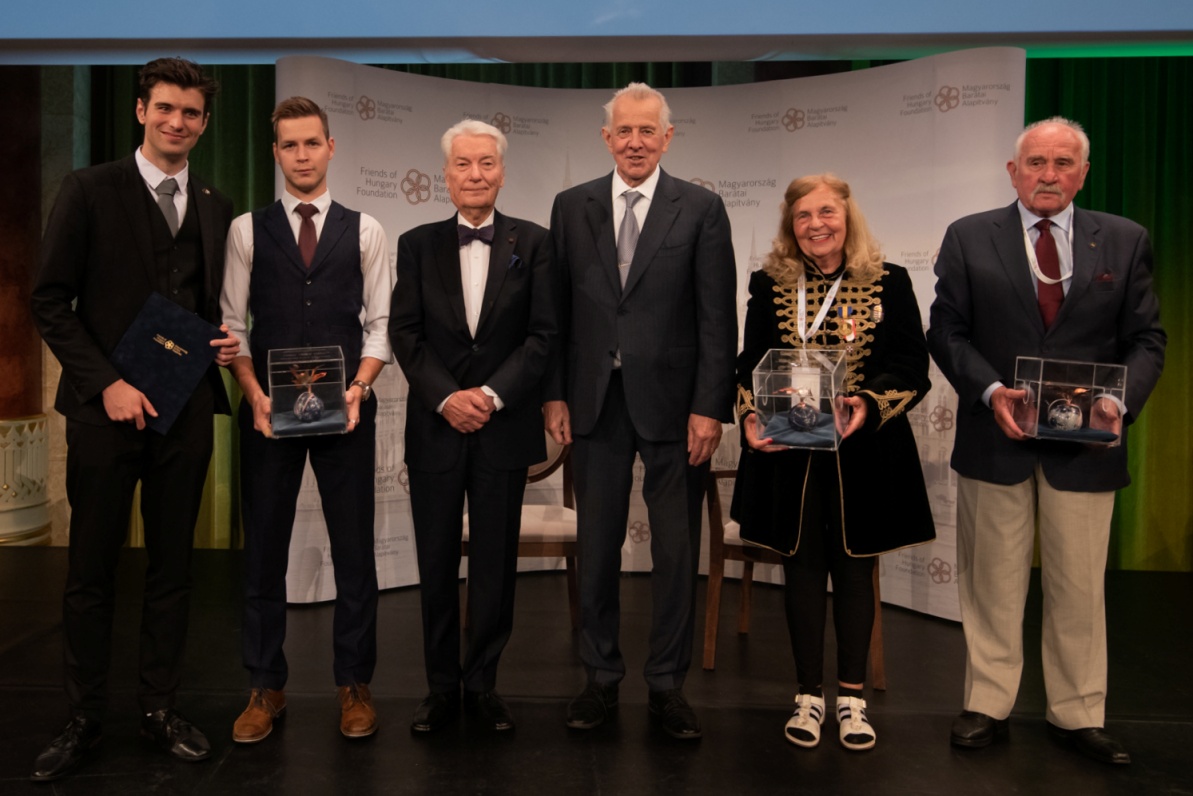
Together with Professor Vizi he presented the Friend of Hungary Award to this year’s winners:
Dr. Judit Kerekes, József Komlóssy, Hungarian Youth Association, (Prof. Béla Bollobás unfortunately could not attend the event).
Via: Hungary Today ; Photos: Hungary Today